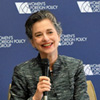Post-Election Iran
Barbara Slavin, The Future of Iran Initiative, The Atlantic Council
Photos | Blog

Washington, DC—On March 16, 2016, Barbara Slavin, acting director of the Future of Iran Initiative at the Atlantic Council and Washington correspondent for Al-Monitor.com, briefed WFPG members and guests on post-election Iran. The conversation focused on the recent Iranian elections and their domestic and foreign policy implications, as well as the role of women in Iran.
The February 26th elections, Slavin explained, were indicative of the limitations of the Iranian political system, as well as the realism and creativity of the Iranian people. Despite the fact that the Guardian Council—a twelve-man body of clerics that vets all who seek to run for elected office in the country—disqualified more than half of the interested candidates from running, a group of Reformists known as the “List of Hope” swept all 30 seats allotted to Tehran in the parliament. Though the final composition of the parliament will not be clear until after the runoff election on April 29th, Slavin predicted that the new parliament will be easier for President Rouhani to deal with, specifically in terms of economic reforms that will attract foreign investment in the aftermath of the nuclear deal.
Speaking on the composition of parliament, Slavin noted that there will be 22 women in the next parliament, the most since the 1979 Revolution. These women are replacing a smaller number of female incumbents who were mostly conservative and had a tendency to support anti-feminist legislation. The presence of 22 women with a different political leaning than their predecessors is seen as a positive development by Slavin, who asserted that similar anti-feminist bills now be defeated.
The outcome of the elections strengthens Iranian foreign policy. Foreign Minister Javad Zarif can enter talks about Syria with confidence, with the knowledge that he will not be impeached. Rouhani is likely to run for reelection in 2017 and keep Zarif as his foreign minister, which will further strengthen the government on foreign policy matters. Speaking on other events in the region, Slavin noted Iran’s minimal involvement with the conflict in Yemen and the heightened tensions with Saudi Arabia, especially in light of their contrasting stances on the conflict in Syria. The Iranian government continues to seek influence in the region, persistently challenging both Saudi Arabia and Israel.
Overall, Slavin took a positive stance on Iran. The Iranian population is overwhelmingly young and well-educated and they continue to push the envelope of societal norms and personal freedoms. Iranians are well-educated, they are entrepreneurs, and they are eager for economic growth following the implementation of the nuclear deal. Though radical political change is unlikely under the current Supreme Leader, it is not a given that he will be replaced by another all-powerful individual or that Iran’s elected institutions will stay stuck in second-class status. In a region full of turmoil, Slavin views Iran’s hedged democracy is a source of hope.